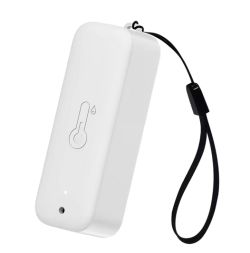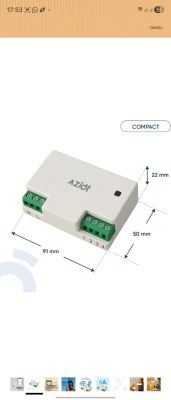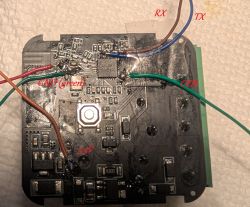Exactly like this (I'm using the kind of mini-test board you promote in the posts) ESP-WROOM-32 - pins connected as in the documentation to EtherCard [github 8-DK] - all in all, I don't know if I'm not doing an uphill job because the ESP32 seems to have ethernet built in somehow?
#include <Arduino.h>
#include <EtherCard.h>
#define STATIC 1 // set to 1 to disable DHCP (adjust myip/gwip values below)
// mac address
static byte mymac[] = {0x74, 0x69, 0x69, 0x2D, 0x30, 0x31};
// ethernet interface ip address
static byte myip[] = {192, 168, 90, 200};
// gateway ip address
static byte gwip[] = {192, 168, 90, 1};
// LED to control output
int ledPin10 = 9;
byte Ethernet::buffer[700];
char const page[] PROGMEM =
"HTTP/1.0 503 Service Unavailable".
"Content-Type: text/html".
"Retry-After: 600"
"}"
"<html>"
"<head> <title>"
"Service Temporarily Unavailable"
"</title> </head>"
"<body>"
"<h3>This page is used behind the scene</h3>"
"<p><em>"
"Commands to control LED are transferred to Arduino.<br />"
"The syntax:
http://192.168.0.XX/?LED10=OFF or ON"
"</em> </p>"
"</body>"
"</html>";
void blinkLed()
{
while (true)
{
digitalWrite(ledPin10, HIGH);
delay(500);
digitalWrite(ledPin10, LOW);
delay(500);
}
}
void setup()
{
pinMode(ledPin10, OUTPUT);
Serial.begin(115200);
Serial.println("Trying to get an IP...");
Serial.print("MAC: ");
for (byte i = 0; i < 6; ++i)
{
Serial.print(mymac
, HEX);
if (i < 5)
Serial.print(':');
}
Serial.println();
if (ether.begin(sizeof Ethernet::buffer, mymac, 15) == 0)
{
Serial.println("Failed to access Ethernet controller;)
}
else
{
Serial.println("Ethernet controller access: OK");
};
#if STATIC
Serial.println("Getting static IP.");
if (!ether.staticSetup(myip, gwip))
{
Serial.println("could not get a static IP");
blinkLed(); // blink forever to indicate a problem
}
#else
Serial.println("Setting up DHCP");
if (!ether.dhcpSetup())
{
Serial.println("DHCP failed");
blinkLed(); // blink forever to indicate a problem
}
#endif
ether.printIp("My IP: ", ether.myip);
ether.printIp("Netmask: ", ether.netmask);
ether.printIp("GW IP: ", ether.gwip);
ether.printIp("DNS IP: ", ether.dnsip);
}
void loop()
{
word len = ether.packetReceive();
word pos = ether.packetLoop(len);
// IF LED10=ON turn it ON
if (strstr((char *)Ethernet::buffer + pos, "GET /?LED10=ON") != 0)
{
Serial.println("Received ON command");
digitalWrite(ledPin10, HIGH);
}
// IF LED10=OFF turn it OFF
if (strstr((char *)Ethernet::buffer + pos, "GET /?LED10=OFF") != 0)
{
Serial.println("Received OFF command");
digitalWrite(ledPin10, LOW);
}
// show some data to the user
memcpy_P(ether.tcpOffset(), page, sizeof page);
ether.httpServerReply(sizeof page - 1);
} .






